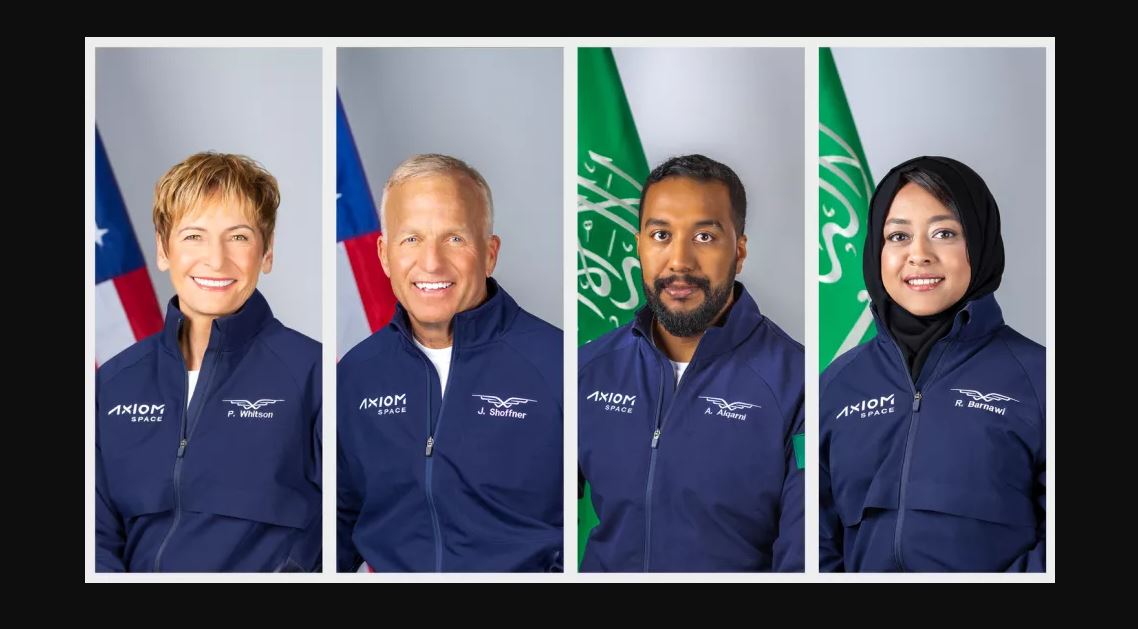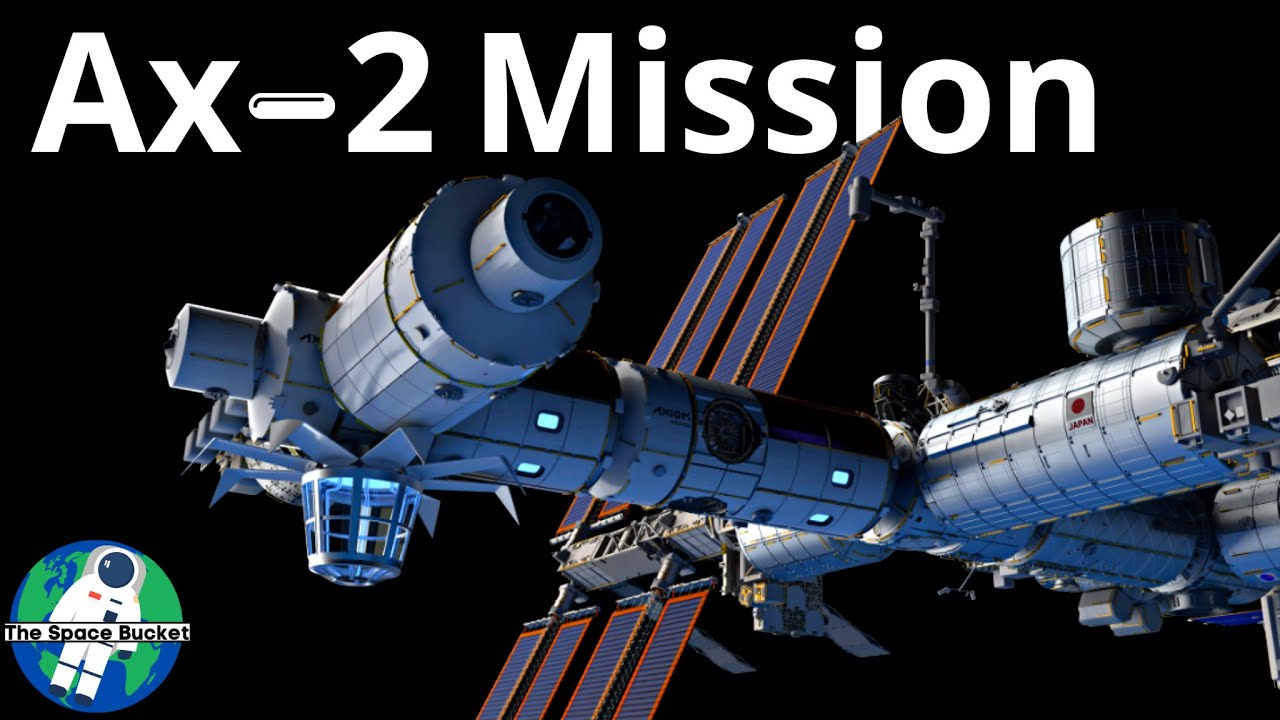Things To Know About The Axiom Space's Ax-2 Second Private Space Station Expedition
In this article are things to know about the Axiom Space's Ax-2 second private space station expedition. Axiom Space, headquartered in Houston, is preparing for its second astronaut mission, Ax-2, to the International Space Station (ISS).
Author:Paula M. GrahamReviewer:Rhyley CarneyMay 18, 202311.1K Shares238K Views

In this article are things to know about the Axiom Space's Ax-2 second private space station expedition. Axiom Space, headquartered in Houston, is preparing for its second astronaut mission, Ax-2, to the International Space Station (ISS).
The Ax-2 mission is scheduled for a launch on Sunday afternoon (May 21) from Pad 39A at NASA's Kennedy Space Center in Florida. A crew of four international astronauts will be launched aboard a SpaceX Falcon 9 rocket, commencing the approximately 10-day flight.
Read on to discover more about the upcoming Ax-2 flight and its significance within Axiom Space's ambitious Earth orbit plans.
What Time Is The Launch?
Ax-2 is set for a 5:37 p.m. EDT (2137 GMT) launch on Sunday, propelling the Crew Dragon capsule Freedom into space. Shortly after, the Falcon 9's first-stage booster will return and land at SpaceX's Landing Zone-1.
Freedom will journey for about 16 hours to reach the ISS, docking on Monday morning (May 22). During their eight-day stay, the four Ax-2 crewmembers will conduct independent research, technology demonstrations, education, and outreach activities alongside the station's current crew.
At the end of May, Ax-2 will undock from the ISS's Harmony module. Freedom will then reenter Earth's atmosphere and splash down in the ocean off the coast of Florida.

Axiom astronauts discuss upcoming mission
Meet The Ax-2 Crew
The highly experienced Peggy Whitson, a former NASA astronaut, will lead Ax-2 as the mission commander. Whitson holds the record for the most time spent in space by a woman or an American, with 665 days.
She has completed 10 spacewalks totaling over 60 hours. As the director of human spaceflight for Axiom, Whitson will also make history as the first female commander of a privately funded mission to orbit. She previously served as the first female commander of an ISS mission during her tenure at NASA. With a Ph.D. in biochemistry, Whitson has contributed nearly four decades to the spaceflight industry, showcasing her remarkable expertise.
Prior to her role as Axiom's director of human spaceflight, Peggy Whitson had held various positions and made significant contributions within the spaceflight industry such as:
- Chief of NASA's Astronaut Office
- NASA Astronaut Selection Board Chair
- NASA Operations Branch Chief
- NASA Medical Sciences Office Deputy Division Chief
Axiom Space has consistently followed a framework of including experienced astronauts to lead private mission crews. The company's first mission to the station, Ax-1, was commanded by retired NASA astronaut Michael López-Alegría in April 2022. This approach will continue, as NASA made it a requirement in August of the previous year.
Joining Ax-2 as the mission's pilot is John Shoffner. Shoffner, known for his advocacy for STEM education and his entrepreneurial spirit, achieved worldwide success in the fiber optic cable industry with his company, the Dura-Line Corporation, during the 1980s.
Shoffner's fascination with space began during the Apollo era, leading him and his friends to form their own "astronaut club" as young boys. By the age of 17, he was already flying airplanes. With a keen interest in photography and HAM radio, Shoffner has planned several photo and amateur radio projects for the Ax-2 mission.
Ali AlQarni, representing the Kingdom of Saudi Arabia, will serve as a mission specialist on Ax-2. With a bachelor's degree in aerospace engineering from King Faisal Air Academy and experience as a fighter pilot in the Royal Saudi Air Force, AlQarni brings a strong aviation background to the mission. Apart from his professional pursuits, he enjoys activities such as bungee jumping, grilling steaks with family, and hiking through the mountains of Saudi Arabia's southern regions.
Rayyanah Barnawi, another mission specialist from Saudi Arabia, contributes her expertise as a biomedical researcher with a focus on cancer stem cell research and tissue reengineering. Barnawi's experiments during the mission will predominantly revolve around breast cancer research. She has traveled extensively for her studies, holding a master's degree in biomedical sciences from Alfaisal University in Saudi Arabia and a bachelor's degree from Otago University in New Zealand.
As members of Saudi Arabia's first astronaut class, AlQarni and Barnawi will not only become the first individuals from the kingdom to visit the ISS but also the second and third Saudi astronauts overall. Notably, Barnawi will make history as the first Saudi woman to venture into space.

NASA & Axiom Space Just Announced A Second Private Astronaut Mission
The Science On Ax-2
During their stay on the space station, the Ax-2 crew will be engaged in a packed schedule of research experiments and technology demonstrations. They are slated to conduct over 20 investigations, encompassing a range of fascinating studies.
Some notable experiments include the assembly of DNA-based nanomaterials for cartilage repair, examining the effects of microgravity on mRNA decay, capturing photographs of lightning strikes and high-altitude transient luminous events (TLEs) called sprites from the ISS Cupola window, and engaging in educational collaborations to promote STEM activities with school children worldwide. Here are a few highlights from the array of experiments Ax-2 will undertake.
- Gravity Loading Countermeasure Skinsuit:Developed by the Massachusetts Institute of Technology, this wearable suit aims to simulate Earth's gravity to counteract the negative effects of microgravity on astronauts' bodies. It complements exercise regimens and helps mitigate issues like spinal elongation, muscle atrophy, and sensorimotor changes during long-term space missions.
- Axiom Space Communication Systems:This technology demonstration focuses on exploring alternative communication methods for astronauts aboard the ISS. The goal is to enhance communication between crewmembers, mission control, and Earth contacts, offering increased flexibility and broader connectivity.
- Multifunctional Shielding Polymer:In collaboration with the Cosmic Shielding Corporation, the Ax-2 crew will evaluate the shielding capabilities of a specialized hydrogen-rich polymer in the ISS's internal radiation environment. This polymer is designed to protect astronauts against radiation in space.
- Cloud Seeding in Microgravity:In partnership with King Fahd University of Petroleum & Minerals, the Saudi Space Commission, and Nanoracks, Ax-2 will conduct experiments related to cloud seeding. By observing water vapor condensation on silver iodide crystals in a moist air reaction chamber onboard the space station, researchers aim to gain insights into weather control technologies on Earth and the potential for creating artificial rain in future off-world habitats.
- TRISH Essential Measures:The Translational Research Institute for Space Health (TRISH) has assigned the Ax-2 crew a series of tests to investigate how commercial spaceflight crewmembers adapt to microgravity. These tests encompass physical evaluations, questionnaires, biological sampling (blood and urine), and the use of wearable devices to monitor microgravity adaptation speed, cognitive performance, and physiological changes during spaceflight. The objective is to develop countermeasures against the negative effects of microgravity, with the aim of reducing recovery times for short-term crews, such as those sent by Axiom to the space station.
- Cancer in Low-Earth Orbit:Building upon a tumor-organoids modeling investigation conducted during Ax-1 in collaboration with the Sanford Stem Cell Institute, this project aims to enhance the detection and treatment of precancerous and cancerous cells. By developing stem cell models in space, the study contributes to improving cancer prevention and understanding other diseases on Earth. The research will expand on previous tumor organoid studies by incorporating triple-negative breast cancer cells into the analysis and focusing on immune dysfunction, drug challenges related to spreading cancers, and immunodeficiencies.
Axiom Space's Plans In Low Earth Orbit
Axiom Space's inaugural mission to the ISS, Ax-1, took place on April 8, 2022, and was extended from 10 to 17 days due to adverse weather conditions near the crew's splashdown site. Going forward, Axiom aims to reduce the time between its missions to the ISS, with Ax-3 scheduled for the end of this year.
Looking ahead, Axiom is part of the growing group of commercial entities focused on constructing a private space station in low Earth orbit (LEO). This station will serve as a hub for research, manufacturing, and tourism. The company is presently working on the construction of its initial module, slated to launch to the ISS in late 2025. Over the following years, additional modules will join the station, which will eventually detach from the ISS to become an independent entity in LEO during the late 2020s.
In addition to its ISS endeavors, Axiom has secured a NASA contract to develop new spacesuits for lunar surface exploration as part of the agency's Artemis program. Artemis 3, planned for a late 2025 launch, will mark the first crewed mission to the moon since the conclusion of the Apollo program in 1972. Axiom's involvement in the development of lunar spacesuits underscores the company's commitment to advancing human exploration beyond Earth orbit.

Paula M. Graham
Author

Rhyley Carney
Reviewer
Latest Articles
Popular Articles